See Page 1 |
2 |
3 of the September 2024 homepage
archives. Friday the 6th
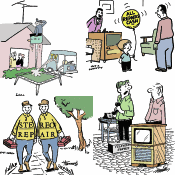 What better way (that can be done in an
office or lab environment) is there to end a long week of work than with a few
electronics-themed comics - in this case from a 1961 issue of Radio-Electronics
magazine (he asks rhetorically)? As can be seen by viewing some of the other comics
of the era, these are concerned with the two biggest crazes of the day - television
and stereophonic systems. In particular, there was an ongoing low-level war persisting
between homeowners and servicemen. It was and is no different that what exits today
between owners and repair services for auto, appliance, computer, and other forms
of personal possessions. I took the liberty of colorizing all of the comics, so
if something looks odd, don't blame the artist ;-) What better way (that can be done in an
office or lab environment) is there to end a long week of work than with a few
electronics-themed comics - in this case from a 1961 issue of Radio-Electronics
magazine (he asks rhetorically)? As can be seen by viewing some of the other comics
of the era, these are concerned with the two biggest crazes of the day - television
and stereophonic systems. In particular, there was an ongoing low-level war persisting
between homeowners and servicemen. It was and is no different that what exits today
between owners and repair services for auto, appliance, computer, and other forms
of personal possessions. I took the liberty of colorizing all of the comics, so
if something looks odd, don't blame the artist ;-)
• Silicon
Content Peaking at 25%
•
ARRL Teachers Institute on Wireless Technology Adds 3rd Level
•
Germany's EV Sales Sink 37% as Subsidies End
• Harnessing Data Paramount to
Reshoring Chip Industry
• AI
Factories Are Hot New Real Estate
 Integrated circuits (IC's) were newcomers
to the world of electronics in 1969. Most people, it is probably safe to say, had
no idea what an integrated circuit (IC) even was. At the time, many experienced
design engineers - perhaps especially experienced design engineers - had no formal
training on the fabrication of integrated circuits. After all, assuming an engineering
student graduated at the age of 22 years old and was in 1969 say, 30 years old,
he or she would have begun junior level classes about 12 years earlier - 1957 for
the sake of argument. Given that Jack Kilby applied for the patent on his ground-breaking,
world's first integrated circuit... Integrated circuits (IC's) were newcomers
to the world of electronics in 1969. Most people, it is probably safe to say, had
no idea what an integrated circuit (IC) even was. At the time, many experienced
design engineers - perhaps especially experienced design engineers - had no formal
training on the fabrication of integrated circuits. After all, assuming an engineering
student graduated at the age of 22 years old and was in 1969 say, 30 years old,
he or she would have begun junior level classes about 12 years earlier - 1957 for
the sake of argument. Given that Jack Kilby applied for the patent on his ground-breaking,
world's first integrated circuit...
 Transcat | Axiom Test Equipment, an electronic
test equipment rental and sales company has published a new blog post that covers
how
battery test systems can check the health of batteries of all shapes and sizes.
We break down the capabilities of various battery test systems and how they can
evaluate voltage, current, power, and energy storage capacity over an expected operating
lifetime. A battery test system with sufficient measurement capabilities and control
functionality can evaluate a battery under test or BUT for its amount of self-discharge
under different operating conditions, such as changes in load and temperature. Finding
a suitable battery test system... Transcat | Axiom Test Equipment, an electronic
test equipment rental and sales company has published a new blog post that covers
how
battery test systems can check the health of batteries of all shapes and sizes.
We break down the capabilities of various battery test systems and how they can
evaluate voltage, current, power, and energy storage capacity over an expected operating
lifetime. A battery test system with sufficient measurement capabilities and control
functionality can evaluate a battery under test or BUT for its amount of self-discharge
under different operating conditions, such as changes in load and temperature. Finding
a suitable battery test system...
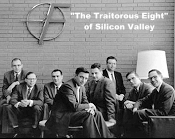 If you are not familiar with "The
Traitorous Eight" in Silicon Valley history, this account should prove interesting.
It was generated entirely by the ChatGPT AI engine. My fairly extensive experience
with ChatGPT is that it is generally very reliable, especially the 4.0 version with
its much more current database. Trust, but verify, though, for critical work. Shockley
Semiconductor Laboratory: The Origin The Origin William Shockley, a Nobel Prize-winning
physicist, co-invented the transistor at Bell Labs in 1947. After leaving Bell Labs,
he sought to commercialize transistor technology and chose Palo Alto, California,
as the location for his new venture... If you are not familiar with "The
Traitorous Eight" in Silicon Valley history, this account should prove interesting.
It was generated entirely by the ChatGPT AI engine. My fairly extensive experience
with ChatGPT is that it is generally very reliable, especially the 4.0 version with
its much more current database. Trust, but verify, though, for critical work. Shockley
Semiconductor Laboratory: The Origin The Origin William Shockley, a Nobel Prize-winning
physicist, co-invented the transistor at Bell Labs in 1947. After leaving Bell Labs,
he sought to commercialize transistor technology and chose Palo Alto, California,
as the location for his new venture...
 This assortment of custom-designed themes
by RF Cafe includes T-Shirts, Mouse Pads, Clocks, Tote Bags, Coffee Mugs and Steins,
Purses, Sweatshirts, Baseball Caps, and more, all sporting my amazingly clever "RF Engineers - We Are the World's
Matchmakers" Smith chart design. These would make excellent gifts for husbands,
wives, kids, significant others, and for handing out at company events or as rewards
for excellent service. My graphic has been ripped off by other people and used on
their products, so please be sure to purchase only official RF Cafe gear. I only
make a couple bucks on each sale - the rest goes to Cafe Press. It's a great way
to help support RF Cafe. Thanks... This assortment of custom-designed themes
by RF Cafe includes T-Shirts, Mouse Pads, Clocks, Tote Bags, Coffee Mugs and Steins,
Purses, Sweatshirts, Baseball Caps, and more, all sporting my amazingly clever "RF Engineers - We Are the World's
Matchmakers" Smith chart design. These would make excellent gifts for husbands,
wives, kids, significant others, and for handing out at company events or as rewards
for excellent service. My graphic has been ripped off by other people and used on
their products, so please be sure to purchase only official RF Cafe gear. I only
make a couple bucks on each sale - the rest goes to Cafe Press. It's a great way
to help support RF Cafe. Thanks...
Thursday the 5th
 These "What's
Your EQ?" (electronics quotient)challenges that appeared in Radio-Electronics
magazine are sort of the electronics enthusiast version of The Old Farmer's Almanac
"Old and New Mathematical Puzzles." Whereas the OFA puzzles could be on any subject
- sometimes including electricity - the RE puzzles are typically based on circuit
analysis and troubleshooting issues. Two of this month's problems are new versions
of old themes. Any time you see a schematic with series and parallel combinations
of components (usually of the same kind), the first thing to do is attempt to redraw
it in a more familiar configuration. The Black Box problems often have more than
one solution; in this instance, at least three "correct" answers were submitted.
The "Over the River" puzzle is reminiscent of an OFA type puzzle. Have fun. These "What's
Your EQ?" (electronics quotient)challenges that appeared in Radio-Electronics
magazine are sort of the electronics enthusiast version of The Old Farmer's Almanac
"Old and New Mathematical Puzzles." Whereas the OFA puzzles could be on any subject
- sometimes including electricity - the RE puzzles are typically based on circuit
analysis and troubleshooting issues. Two of this month's problems are new versions
of old themes. Any time you see a schematic with series and parallel combinations
of components (usually of the same kind), the first thing to do is attempt to redraw
it in a more familiar configuration. The Black Box problems often have more than
one solution; in this instance, at least three "correct" answers were submitted.
The "Over the River" puzzle is reminiscent of an OFA type puzzle. Have fun.
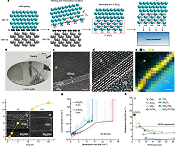 "A team of electrical and computer engineers
at Shanghai Institute of Microsystem and Information Technology, Chinese Academy
of Sciences, working with one colleague from City University of Hong Kong and another
with Fudan University, has developed a new
two-dimensional, low-power-consumption field-effect transistor (FET) that could
allow smartphones to need recharging less often. In their paper published in the
journal Nature, the group describes how they overcame problems with high gate leakage
and low dielectric strength that have stymied..." "A team of electrical and computer engineers
at Shanghai Institute of Microsystem and Information Technology, Chinese Academy
of Sciences, working with one colleague from City University of Hong Kong and another
with Fudan University, has developed a new
two-dimensional, low-power-consumption field-effect transistor (FET) that could
allow smartphones to need recharging less often. In their paper published in the
journal Nature, the group describes how they overcame problems with high gate leakage
and low dielectric strength that have stymied..."
 In the late 1960s when this story appeared
in Electronics World magazine, the television industry was just getting
started with building out
infrastructure for cable TV delivery to homes. All signals were analog of course,
and there was very little digitization of receiver circuitry in TV sets; i.e., synthesized
tuners. A large percentage of televisions used vacuum tubes and relied on twin lead
transmission cable between a rooftop antenna and the back of the set. The plug-in
connection of vacuum tubes often caused problems due to high resistance contacts
between the tube pins and the sockets, and could also suffer from PIM signals generated
by corroded contacts. Unshielded twin lead, which has the advantage of much lower
signal loss than coax, was a prime source of interference pick-up, especially if
a long run was used. Cable TV used a 72-Ω coaxial cable between the street connection
and the receiver, so it was pretty much immune to interference. Mac's trusty sidekick,
Barney, solved an interference issue caused by a combination of a loose tube in
on neighbor's TV set and a long twin lead cable used by the guy across the street... In the late 1960s when this story appeared
in Electronics World magazine, the television industry was just getting
started with building out
infrastructure for cable TV delivery to homes. All signals were analog of course,
and there was very little digitization of receiver circuitry in TV sets; i.e., synthesized
tuners. A large percentage of televisions used vacuum tubes and relied on twin lead
transmission cable between a rooftop antenna and the back of the set. The plug-in
connection of vacuum tubes often caused problems due to high resistance contacts
between the tube pins and the sockets, and could also suffer from PIM signals generated
by corroded contacts. Unshielded twin lead, which has the advantage of much lower
signal loss than coax, was a prime source of interference pick-up, especially if
a long run was used. Cable TV used a 72-Ω coaxial cable between the street connection
and the receiver, so it was pretty much immune to interference. Mac's trusty sidekick,
Barney, solved an interference issue caused by a combination of a loose tube in
on neighbor's TV set and a long twin lead cable used by the guy across the street...
ISM Band Passive RF Products
from IPP
 Innovative Power Products is proud to introduce
new
passive power products for ISM bands used in industrial, scientific, medical,
and other applications. These 90-degree hybrid couplers cover the 902 - 928 MHz
and the 2.4 - 2.5 GHz bands with power ratings up to 1,000 watts CW. IPP
also provides in-phase combiners/dividers, RF terminations, directional couplers,
baluns, and single-ended impedance transformers in the ISM bands. Applications include
all industrial, scientific, and medical equipment requiring highest quality, performance,
reliability components... Innovative Power Products is proud to introduce
new
passive power products for ISM bands used in industrial, scientific, medical,
and other applications. These 90-degree hybrid couplers cover the 902 - 928 MHz
and the 2.4 - 2.5 GHz bands with power ratings up to 1,000 watts CW. IPP
also provides in-phase combiners/dividers, RF terminations, directional couplers,
baluns, and single-ended impedance transformers in the ISM bands. Applications include
all industrial, scientific, and medical equipment requiring highest quality, performance,
reliability components...
 The discovery of the
cosmic microwave background radiation (CMBR) is one of the most significant
breakthroughs in modern cosmology, providing crucial evidence for the Big Bang theory
of the universe's origin. In the early 1960s, a team at Bell Telephone Laboratories,
including Arno Penzias and Robert Wilson, unintentionally stumbled upon this discovery
while working on a very different project. They were using a large, horn-shaped
antenna, often referred to as the "Holmdel Horn Antenna" or the "Sugar Scoop" due
to its shape, for radio astronomy experiments. Their initial goal was to study radio
emissions from various sources in space, but they encountered an unusual form of
interference that they could not explain or eliminate... The discovery of the
cosmic microwave background radiation (CMBR) is one of the most significant
breakthroughs in modern cosmology, providing crucial evidence for the Big Bang theory
of the universe's origin. In the early 1960s, a team at Bell Telephone Laboratories,
including Arno Penzias and Robert Wilson, unintentionally stumbled upon this discovery
while working on a very different project. They were using a large, horn-shaped
antenna, often referred to as the "Holmdel Horn Antenna" or the "Sugar Scoop" due
to its shape, for radio astronomy experiments. Their initial goal was to study radio
emissions from various sources in space, but they encountered an unusual form of
interference that they could not explain or eliminate...
 KR Electronics has been designing and manufacturing custom filters
for military and commercial radio, radar, medical, and communications since 1973.
KR Electronics' line of filters
includes lowpass, highpass, bandpass, bandstop, equalizer, duplexer, diplexer, and
individually synthesized filters for special applications - both commercial and
military. State of the art computer synthesis, analysis and test methods are used
to meet the most challenging specifications. All common connector types and package
form factors are available. Please visit their website today to see how they might
be of assistance. Products are designed and manufactured in the USA. KR Electronics has been designing and manufacturing custom filters
for military and commercial radio, radar, medical, and communications since 1973.
KR Electronics' line of filters
includes lowpass, highpass, bandpass, bandstop, equalizer, duplexer, diplexer, and
individually synthesized filters for special applications - both commercial and
military. State of the art computer synthesis, analysis and test methods are used
to meet the most challenging specifications. All common connector types and package
form factors are available. Please visit their website today to see how they might
be of assistance. Products are designed and manufactured in the USA.
 With more than 1000
custom-built stencils, this has got to be the most comprehensive set of
Visio Stencils
available for RF, analog, and digital system and schematic drawings! Every stencil
symbol has been built to fit proportionally on the included A-, B-, and C-size drawing
page templates (or use your own page if preferred). Components are provided for
system block diagrams, conceptual drawings, schematics, test equipment, racks, and
more. Page templates are provided with a preset scale (changeable) for a good presentation
that can incorporate all provided symbols... With more than 1000
custom-built stencils, this has got to be the most comprehensive set of
Visio Stencils
available for RF, analog, and digital system and schematic drawings! Every stencil
symbol has been built to fit proportionally on the included A-, B-, and C-size drawing
page templates (or use your own page if preferred). Components are provided for
system block diagrams, conceptual drawings, schematics, test equipment, racks, and
more. Page templates are provided with a preset scale (changeable) for a good presentation
that can incorporate all provided symbols...
Wednesday the 4th
 Bell Telephone Laboratories developed the
T1 system (Transmission
System 1) in the late 1950s and early 1960s as a pioneering digital transmission
system that revolutionized telecommunications. It was the first widely implemented
digital carrier system, laying the foundation for modern digital communication networks.
As reported in this October 1961 issue of Radio-Electronics magazine "News
Briefs" column, theT1 system was still in the development and installation phase,
while public T1 service would begin the next year. It facilitated 24 voice channels
over an existing twisted pair of copper wires, where before only a single call could
be handled per pair. Also mentioned was a shortage of TV sets as people clamored
for the improved, transistorized color... Bell Telephone Laboratories developed the
T1 system (Transmission
System 1) in the late 1950s and early 1960s as a pioneering digital transmission
system that revolutionized telecommunications. It was the first widely implemented
digital carrier system, laying the foundation for modern digital communication networks.
As reported in this October 1961 issue of Radio-Electronics magazine "News
Briefs" column, theT1 system was still in the development and installation phase,
while public T1 service would begin the next year. It facilitated 24 voice channels
over an existing twisted pair of copper wires, where before only a single call could
be handled per pair. Also mentioned was a shortage of TV sets as people clamored
for the improved, transistorized color...
 "Gotonomi, a UAV satellite connectivity
solutions provider, has announced the completion of further successful flight trials
and the opening of orders for production units of all variants of its
UAV satcom terminals at Commercial UAV Expo 2024 in Las Vegas. The launch marks
a significant milestone, transitioning from pre-production flight development kits
to type-approved, commercial terminals, enabling scalable beyond visual line of
sight operations (BVLOS) for drone operators wishing to offer inspection, surveillance,
and delivery services. Following extensive verification testing, including flight
trials..." "Gotonomi, a UAV satellite connectivity
solutions provider, has announced the completion of further successful flight trials
and the opening of orders for production units of all variants of its
UAV satcom terminals at Commercial UAV Expo 2024 in Las Vegas. The launch marks
a significant milestone, transitioning from pre-production flight development kits
to type-approved, commercial terminals, enabling scalable beyond visual line of
sight operations (BVLOS) for drone operators wishing to offer inspection, surveillance,
and delivery services. Following extensive verification testing, including flight
trials..."
 Hewlett Packard introduced
their electronic
HP-35 Scientific Calculator in 1972. It was not the world's first pocket-size
electronic calculator - that distinction went to the Busicom LE-120A. However it
was the first to be designed for the science, engineering, and financial communities
with its many built-in math functions. Use of Reverse Polish Notation (RPN) might
have scared off many would-be users who were easily confused by anything other than
the traditional notation (algebraic) that mimics written form; i.e., 2 + 3 = 5 (ALG),
as opposed to 2 3 + [=] 5 (RPN). Wisely, HP made both modes selectable... Hewlett Packard introduced
their electronic
HP-35 Scientific Calculator in 1972. It was not the world's first pocket-size
electronic calculator - that distinction went to the Busicom LE-120A. However it
was the first to be designed for the science, engineering, and financial communities
with its many built-in math functions. Use of Reverse Polish Notation (RPN) might
have scared off many would-be users who were easily confused by anything other than
the traditional notation (algebraic) that mimics written form; i.e., 2 + 3 = 5 (ALG),
as opposed to 2 3 + [=] 5 (RPN). Wisely, HP made both modes selectable...
 Exodus Advanced Communications, is a multinational
RF communication equipment and engineering service company serving both commercial
and government entities and their affiliates worldwide. We are pleased to announce
the model
AMP2074P-2KW Pulse Amplifier. It is designed for pulse, EMC/EMI Mil-Std 461
and pulse radar applications. Provides superb pulse fidelity up to 100 μsec
pulse widths. Duty cycles to 10% with a minimum 63 dB gain. Available monitoring
parameters for forward/reflected power in watts & dBm, VSWR, voltage, current,
temperature sensing for outstanding reliability and ruggedness in a compact 4U chassis... Exodus Advanced Communications, is a multinational
RF communication equipment and engineering service company serving both commercial
and government entities and their affiliates worldwide. We are pleased to announce
the model
AMP2074P-2KW Pulse Amplifier. It is designed for pulse, EMC/EMI Mil-Std 461
and pulse radar applications. Provides superb pulse fidelity up to 100 μsec
pulse widths. Duty cycles to 10% with a minimum 63 dB gain. Available monitoring
parameters for forward/reflected power in watts & dBm, VSWR, voltage, current,
temperature sensing for outstanding reliability and ruggedness in a compact 4U chassis...
 Everything is relative... just ask Albert
Einstein. The use of terms like "contemporary," "modern," etc., in the titles of
books has always annoyed me. They would be okay if the titles also included the
year or at least the decade to which the claim applies. Not quite as nefarious is
the claim of "high frequency" when describing electronics components since it is
safe to assume that most readers understand the era to which it applies. To a lesser
extent that goes for "high voltage" and "high current." This 1964 advertisement
for
Motorola's Oxide-Passivated Silicon Annular Transistors appeared in Electronics
magazine touting the high frequency capability for switching and RF amplification... Everything is relative... just ask Albert
Einstein. The use of terms like "contemporary," "modern," etc., in the titles of
books has always annoyed me. They would be okay if the titles also included the
year or at least the decade to which the claim applies. Not quite as nefarious is
the claim of "high frequency" when describing electronics components since it is
safe to assume that most readers understand the era to which it applies. To a lesser
extent that goes for "high voltage" and "high current." This 1964 advertisement
for
Motorola's Oxide-Passivated Silicon Annular Transistors appeared in Electronics
magazine touting the high frequency capability for switching and RF amplification...
 RF Cascade Workbook is the next phase in the evolution of RF Cafe's long-running
series, RF Cascade Workbook. Chances are you have never used a spreadsheet
quite like this (click
here for screen capture). It is a full-featured RF system cascade parameter
and frequency planner that includes filters and mixers for a mere $45. Built in
MS Excel, using RF Cascade Workbook is a cinch and the format
is entirely customizable. It is significantly easier and faster than using a multi-thousand
dollar simulator when a high level system analysis is all that is needed...
RF Cascade Workbook is the next phase in the evolution of RF Cafe's long-running
series, RF Cascade Workbook. Chances are you have never used a spreadsheet
quite like this (click
here for screen capture). It is a full-featured RF system cascade parameter
and frequency planner that includes filters and mixers for a mere $45. Built in
MS Excel, using RF Cascade Workbook is a cinch and the format
is entirely customizable. It is significantly easier and faster than using a multi-thousand
dollar simulator when a high level system analysis is all that is needed...
Tuesday the 3rd
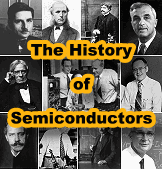 This is a brief accounting of the
history
of semiconductor electronics. It was generated entirely based on specific prompts
to ChatGPT, and is presented without editing; i.e., it may contain errors. I was
surprised to see how far back investigations into semiconductors reaches - all the
way to Michael Faraday. It mentioned the Silicon Valley "Traitorous Eight," which
I had not known about. I will asked ChatGPT for more detail on that, and will post
it sometime in the next day or so. The chart on the left is from an IEEE Spectrum
magazine story entitled, "The Ultimate Transistor Timeline..." This is a brief accounting of the
history
of semiconductor electronics. It was generated entirely based on specific prompts
to ChatGPT, and is presented without editing; i.e., it may contain errors. I was
surprised to see how far back investigations into semiconductors reaches - all the
way to Michael Faraday. It mentioned the Silicon Valley "Traitorous Eight," which
I had not known about. I will asked ChatGPT for more detail on that, and will post
it sometime in the next day or so. The chart on the left is from an IEEE Spectrum
magazine story entitled, "The Ultimate Transistor Timeline..."
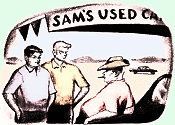 Hmmm... this is the first time recall either
of
Carl's or Jerry's father, at least where either was present in the story. Their
mothers are mentioned on occasion for providing sandwiches or uttering words of
caution when embarking on a sleuthing mission. In this 1960 Popular Electronics
magazine episode titled "Two Tough Customers," creator and author John T.
Frye has the techno-teens set out on an adventure to shop for a good deal on a fundamentally
sound car - which they would own in a partnership set up by their fathers. As you
would expect if you are an ardent C&J follower, their effort includes inspecting
not just the mechanical... Hmmm... this is the first time recall either
of
Carl's or Jerry's father, at least where either was present in the story. Their
mothers are mentioned on occasion for providing sandwiches or uttering words of
caution when embarking on a sleuthing mission. In this 1960 Popular Electronics
magazine episode titled "Two Tough Customers," creator and author John T.
Frye has the techno-teens set out on an adventure to shop for a good deal on a fundamentally
sound car - which they would own in a partnership set up by their fathers. As you
would expect if you are an ardent C&J follower, their effort includes inspecting
not just the mechanical...
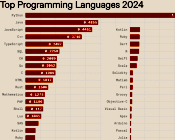 To some degree, I have done programming
in Turbo Pascal, Delphi, Visual Basic, JavaScript, and PHP. Only one of them (JS)
makes more than a slit on this IEEE chart of
2024's top languages.
"Welcome to IEEE Spectrum's 11th annual rankings of the most popular programming
languages. As always, we combine multiple metrics from different sources to create
three meta rankings. The 'Spectrum' ranking is weighted towards the profile of the
typical IEEE member, the 'Trending' ranking seeks to spot languages that are in
the zeitgeist, and the 'Jobs' ranking measures what employers are looking for..." To some degree, I have done programming
in Turbo Pascal, Delphi, Visual Basic, JavaScript, and PHP. Only one of them (JS)
makes more than a slit on this IEEE chart of
2024's top languages.
"Welcome to IEEE Spectrum's 11th annual rankings of the most popular programming
languages. As always, we combine multiple metrics from different sources to create
three meta rankings. The 'Spectrum' ranking is weighted towards the profile of the
typical IEEE member, the 'Trending' ranking seeks to spot languages that are in
the zeitgeist, and the 'Jobs' ranking measures what employers are looking for..."
 If you're a newcomer to the game, it may
seem that radio theory already has enough mystery without adding more. True, the
technical journals - even the ARRL's QST magazine, sometimes - do make
it a mysterious subject with their textbook language and complex notations. Radio
isn't really any more mysterious or complex than many a detective story - at least
not after you've read the last page and know "who-dunit." The difference lies in
the method of presentation. There may be some utility, then, in the idea of presenting
radio fundamentals in the manner of detective fiction. That's what this is - a series
of radio lessons in the guise of a
detective-mystery
yarn. Instead of human characters we'll use another kind - but we'll try to make
the characterizations true... If you're a newcomer to the game, it may
seem that radio theory already has enough mystery without adding more. True, the
technical journals - even the ARRL's QST magazine, sometimes - do make
it a mysterious subject with their textbook language and complex notations. Radio
isn't really any more mysterious or complex than many a detective story - at least
not after you've read the last page and know "who-dunit." The difference lies in
the method of presentation. There may be some utility, then, in the idea of presenting
radio fundamentals in the manner of detective fiction. That's what this is - a series
of radio lessons in the guise of a
detective-mystery
yarn. Instead of human characters we'll use another kind - but we'll try to make
the characterizations true...
 Banner Ads are rotated in all locations
on the page! RF Cafe typically receives 8,000-15,000 visits each
weekday. RF Cafe
is a favorite of engineers, technicians, hobbyists, and students all over the world.
With more than 17,000 pages in the Google search index, RF Cafe returns in
favorable positions on many types of key searches, both for text and images.
Your Banner Ads are displayed on average0,000 times per year! New content
is added on a daily basis, which keeps the major search engines interested enough
to spider it multiple times each day. Items added on the homepage often can be found
in a Google search within a few hours of being posted. If you need your company
news to be seen, RF Cafe is the place to be... Banner Ads are rotated in all locations
on the page! RF Cafe typically receives 8,000-15,000 visits each
weekday. RF Cafe
is a favorite of engineers, technicians, hobbyists, and students all over the world.
With more than 17,000 pages in the Google search index, RF Cafe returns in
favorable positions on many types of key searches, both for text and images.
Your Banner Ads are displayed on average0,000 times per year! New content
is added on a daily basis, which keeps the major search engines interested enough
to spider it multiple times each day. Items added on the homepage often can be found
in a Google search within a few hours of being posted. If you need your company
news to be seen, RF Cafe is the place to be...
Monday the 2nd
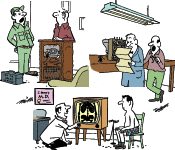 It is Labor Day here in the U.S., so most
folks are enjoying a day off. I, of course, work on RF Cafe every day since expectations
for new content are different depending on a website visitor's country's norms.
These three
electronics-themed comics appeared in a 1960 issue of Radio-Electronics
magazine. All are related to television, which was a big thing back in the day since
it was a relatively new addition to many households. Today, everyone has effectively
a TV in his/her pocket or purse. It almost never requires service, and has excellent
reception just about everywhere. Our forebears have provided a mighty service through
hard work and dedication. I took the liberty of colorizing the original black and
white line drawings... It is Labor Day here in the U.S., so most
folks are enjoying a day off. I, of course, work on RF Cafe every day since expectations
for new content are different depending on a website visitor's country's norms.
These three
electronics-themed comics appeared in a 1960 issue of Radio-Electronics
magazine. All are related to television, which was a big thing back in the day since
it was a relatively new addition to many households. Today, everyone has effectively
a TV in his/her pocket or purse. It almost never requires service, and has excellent
reception just about everywhere. Our forebears have provided a mighty service through
hard work and dedication. I took the liberty of colorizing the original black and
white line drawings...
 As with so many aspects of electronics, physics,
economics, medicine (well, maybe not medicine), the basics do not change a whole
lot since first being discovered. If you are a newcomer to the world of electronics
and are trying to come up to speed on
transistor construction and operation, even this article that appeared in a
1968 issue or Radio-Electronics magazine will be useful to you. Figure 1
reminds me of a situation I witnessed while working as a technician at Westinghouse
Oceanic Division, in Annapolis, Maryland. If you've heard this before, please indulge
me. One of the managers there, who was not a degreed engineer... As with so many aspects of electronics, physics,
economics, medicine (well, maybe not medicine), the basics do not change a whole
lot since first being discovered. If you are a newcomer to the world of electronics
and are trying to come up to speed on
transistor construction and operation, even this article that appeared in a
1968 issue or Radio-Electronics magazine will be useful to you. Figure 1
reminds me of a situation I witnessed while working as a technician at Westinghouse
Oceanic Division, in Annapolis, Maryland. If you've heard this before, please indulge
me. One of the managers there, who was not a degreed engineer...
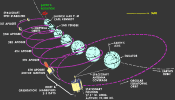 Satellite evolution occurred at a rapid
pace once Sputnik and Echo were successfully launched in the late 1950s. Sputnik
was a simple beacon transmitter whose signal was used to measure orbital and atmospheric
properties and their effects on radio signals. Oh, and also to announce to the world
that the USSR had accomplished the world's first satellite mission - I'd brag, too.
Explorer 1, the first U.S. satellite, launched the following year, measured
and broadcast Van Allen Radiation Belt data. This Electronics World magazine
article appeared about a decade into the satellite aspect of the "Space Race." By
then, a couple dozen satellites were circling (well, more accurately ellipticalling[sic]
the earth, and they were active transponders that received on one frequency, then
re-transmitted the amplified signal... Satellite evolution occurred at a rapid
pace once Sputnik and Echo were successfully launched in the late 1950s. Sputnik
was a simple beacon transmitter whose signal was used to measure orbital and atmospheric
properties and their effects on radio signals. Oh, and also to announce to the world
that the USSR had accomplished the world's first satellite mission - I'd brag, too.
Explorer 1, the first U.S. satellite, launched the following year, measured
and broadcast Van Allen Radiation Belt data. This Electronics World magazine
article appeared about a decade into the satellite aspect of the "Space Race." By
then, a couple dozen satellites were circling (well, more accurately ellipticalling[sic]
the earth, and they were active transponders that received on one frequency, then
re-transmitted the amplified signal...
 The newest release of RF Cafe's spreadsheet
(Excel) based engineering and science calculator is now available -
Espresso Engineering Workbook™. Among other additions, it now has a Butterworth
Bandpass Calculator, and a Highpass Filter Calculator that does not just gain, but
also phase and group delay! Since 2002,
the original Calculator Workbook has been available as a free download.
Continuing the tradition, RF Cafe Espresso Engineering Workbook™ is
also provided at no cost,
compliments of my generous sponsors. The original calculators are included, but
with a vastly expanded and improved user interface. Error-trapped user input cells
help prevent entry of invalid values. An extensive use of Visual Basic for Applications
(VBA) functions now do most of the heavy lifting with calculations, and facilitates
a wide user-selectable choice of units for voltage, frequency, speed, temperature,
power, wavelength, weight, etc. In fact, a full page of units conversion calculators
is included. A particularly handy feature is the ability to specify the the number
of significant digits to display. Drop-down menus are provided for convenience... The newest release of RF Cafe's spreadsheet
(Excel) based engineering and science calculator is now available -
Espresso Engineering Workbook™. Among other additions, it now has a Butterworth
Bandpass Calculator, and a Highpass Filter Calculator that does not just gain, but
also phase and group delay! Since 2002,
the original Calculator Workbook has been available as a free download.
Continuing the tradition, RF Cafe Espresso Engineering Workbook™ is
also provided at no cost,
compliments of my generous sponsors. The original calculators are included, but
with a vastly expanded and improved user interface. Error-trapped user input cells
help prevent entry of invalid values. An extensive use of Visual Basic for Applications
(VBA) functions now do most of the heavy lifting with calculations, and facilitates
a wide user-selectable choice of units for voltage, frequency, speed, temperature,
power, wavelength, weight, etc. In fact, a full page of units conversion calculators
is included. A particularly handy feature is the ability to specify the the number
of significant digits to display. Drop-down menus are provided for convenience...
These archive pages are provided in order to make it easier for you to find items
that you remember seeing on the RF Cafe homepage. Of course probably the easiest
way to find anything on the website is to use the "Search
RF Cafe" box at the top of every page. Some quoted items have been shortened
to save space. About RF Cafe.
Homepage Archive Pages
2026:
Jan |
Feb | Mar | Apr | May | Jun | Jul | Aug
| Sep | Oct | Nov | Dec
2025:
Jan |
Feb |
Mar |
Apr |
May |
Jun |
Jul |
Aug |
Sep |
Oct |
Nov |
Dec
2024:
Jan |
Feb |
Mar |
Apr |
May |
Jun |
Jul |
Aug |
Sep |
Oct |
Nov |
Dec
2023:
Jan |
Feb |
Mar |
Apr |
May |
Jun |
Jul |
Aug |
Sep |
Oct |
Nov |
Dec
2022:
Jan |
Feb |
Mar |
Apr |
May |
Jun |
Jul |
Aug |
Sep |
Oct |
Nov |
Dec
2021:
Jan |
Feb |
Mar |
Apr |
May |
Jun |
Jul |
Aug |
Sep |
Oct |
Nov |
Dec
2020:
Jan |
Feb |
Mar |
Apr |
May |
Jun |
Jul |
Aug |
Sep |
Oct |
Nov |
Dec
2019:
Jan |
Feb |
Mar |
Apr |
May |
Jun |
Jul |
Aug |
Sep |
Oct |
Nov |
Dec
2018:
Jan |
Feb |
Mar |
Apr |
May |
Jun |
Jul |
Aug |
Sep |
Oct |
Nov |
Dec
2017:
Jan | Feb |
Mar |
Apr |
May |
Jun |
Jul |
Aug |
Sep |
Oct |
Nov |
Dec
2016:
Jan | Feb |
Mar |
Apr |
May |
Jun |
Jul |
Aug |
Sep |
Oct |
Nov |
Dec
2015:
Jan | Feb |
Mar |
Apr |
May |
Jun |
Jul |
Aug | Sep |
Oct |
Nov |
Dec
2014:
Jan | Feb |
Mar |
Apr |
May |
Jun |
Jul |
Aug |
Sep |
Oct |
Nov |
Dec
2013:
Jan | Feb |
Mar |
Apr |
May |
Jun |
Jul |
Aug |
Sep |
Oct |
Nov |
Dec
2012: 1 |
2 | 3
| 4 | 5
| 6 | 7
| 8 | 9
| 10 | 11
| 12 | 13
(no archives before 2012)
- Christmas-themed
items
|





 Integrated circuits (IC's)
Integrated circuits (IC's)



















 Satellite evolution
Satellite evolution



